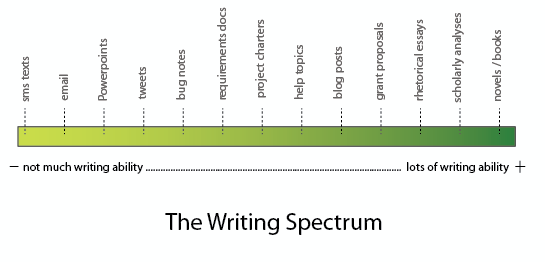What Does It Mean to Know How to Write?
A lot of people feel confident in their writing abilities in an organization. And many times one's writing skills are perfectly suitable for the task. Other times they are hopelessly below readability. Why do so many people think they can write when they really can't?
One reason may be context. A person may be skilled at writing e-mail, but writing an 800 word article is another matter. A person may be skilled at noting steps to reproduce a bug, but articulating a complicated help procedure requiring multiple sequences and prerequisites can be more difficult. A person may be good at coming up with 140 character tweets, but organizing 1,000 help topics in a structure that makes sense to a variety of users with different skill levels is another task.
It seems that writing is a spectrum skill, so you have people who get by all the time with email, Powerpoint presentations, and other written content. This leads them to believe they can write in any situation. But that is only one end of the spectrum. On the other end of the spectrum we have original idea development, organization of lengthy arguments, style and flow and voice, and a host of other elements that require more advanced abilities.
It's kind of like miniature golf versus real golf. Should a person who excels at miniature golf expect to excel at real golf, exclaiming proudly that he or she golfs? Should someone handy at putting on bandaids feel confident about handling an emergency room situation with scalpels and needles?
The argument can even apply to technical writers themselves. Just because one is a technical writer, it doesn't mean the ability to write extends beyond help material. We have to remember that writing ability is relative to the task. When you move from a help manual to something else, like an op-ed in a newspaper, or a lengthy critical essay, or a book or novel, at some point the writing ability is strained.
In fact, writing help itself has several levels to it. On the outset, it seems like a simple formula: identify a task, explain why a user would want to perform the task, and then list the steps required to complete the task. But on a deeper level, how do you identify all the tasks your audience needs to perform? How do you organize all the information in an easy-to-find way? Why is it when users go to help, they rarely find the information they need?
So even technical writing has a variety of writing skill levels, and while one person may confidently write a help topic, the ability doesn't necessarily extend to organizing a useful help system.
What's concerning about the belief that "anyone can write" is that it persuades people with deeper writing abilities to look past writing and seek other skillsets. I've moved in the direction of screencasts, layout and design, and content strategy. But my greatest strength is not doing any of these. It's writing. That's my core talent.
At the lower level, anyone can write emails and come up with okay interface text; they can write simple help topics and product announcements. But if you need something more difficult, like an engaging corporate blog post that attracts new community members, or an in-depth report for senior leaders that keeps their attention, or a how-to course to teach people to use a complicated system, you actually need someone with more advanced writing skills. If these people have moved on to other specializations that are more valued in the long run, they do their company and themselves a disservice.
Sep 19 update: For a better exploration of this topic, check out Mark Baker's Three Components of Writing Skill. Also check out Ellis Pratt's response.
About Tom Johnson

I'm an API technical writer based in the Seattle area. On this blog, I write about topics related to technical writing and communication — such as software documentation, API documentation, AI, information architecture, content strategy, writing processes, plain language, tech comm careers, and more. Check out my API documentation course if you're looking for more info about documenting APIs. Or see my posts on AI and AI course section for more on the latest in AI and tech comm.
If you're a technical writer and want to keep on top of the latest trends in the tech comm, be sure to subscribe to email updates below. You can also learn more about me or contact me. Finally, note that the opinions I express on my blog are my own points of view, not that of my employer.

